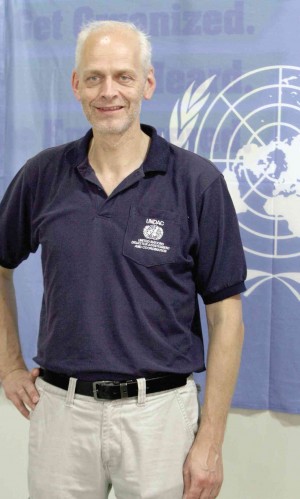Filipinos’ coping mechanism impresses UN exec

JESPER Holmer Lund of UN Office for the Coordination of Humanitarian Affairs at Ormoc City Hall RICHARD A. REYES
ORMOC CITY—Describing Supertyphoon “Yolanda’s” scale of destruction and impact as beyond belief, the head of the humanitarian mission of the United Nations here was impressed by the coping mechanism of the survivors as well as the early warning systems implemented by local governments in many devastated areas.
“I’ve been to many emergencies and have not seen such a strong community spirit before, so strong coping mechanism,” mused Jesper Holmer Lund, chief of emergency services branch, surge capacity and logistics section of the UN Office for the Coordination of Humanitarian Affairs (Unocha) in an interview in this city on Saturday.
Lund, who has been out in the last three days with Unocha team visiting interior areas in Ormoc City and nearby areas struck by the typhoon to do assessment and provide food and blankets, saw how families coped with the disaster.
“Wherever we went, we saw people taking down what was left of their houses, repairing them and building small shelters to house their families under the rain,” he narrated.
The Unocha is coordinating the efforts of some 30 international organizations helping the disaster-stricken areas in central Philippines so that there would be no duplication of the assistance to the communities, Lund said.
Article continues after this advertisementHe said they were closely coordinating and supporting the local governments in the relief, rehabilitation and recovery activities.
Article continues after this advertisementLund said the next phase after relief operations would be the rebuilding of the lives of the victims of disaster, which include reconstructing houses and community structures and funding livelihood destroyed by Yolanda, said to be the strongest typhoon in history.
“It is important that at this stage we look at their livelihood so that people can go back to their normal lives and farming can start as soon as possible,” he said.
Lund emphasized that providing free food would last until they have gone back to farming and have harvested their crops.
“So we have to be very smart in providing food until they start farming and as soon as they start to harvest, we will scale down on giving them [relief items],” he said.
In close coordination with local governments, food for work would be implemented to rebuild schools and other public infrastructures like community centers to provide alternative work and infuse cash into the ravaged communities, Lund said.
He, meanwhile, commended the local government of Ormoc for an effective early warning system and efficient relief distribution that allowed the people in the city to focus on reconstruction because they have food on the table.
But Lund said there would be a lot of work to do for the government, the communities and the international organizations to help bring life back to normal in the devastated areas.